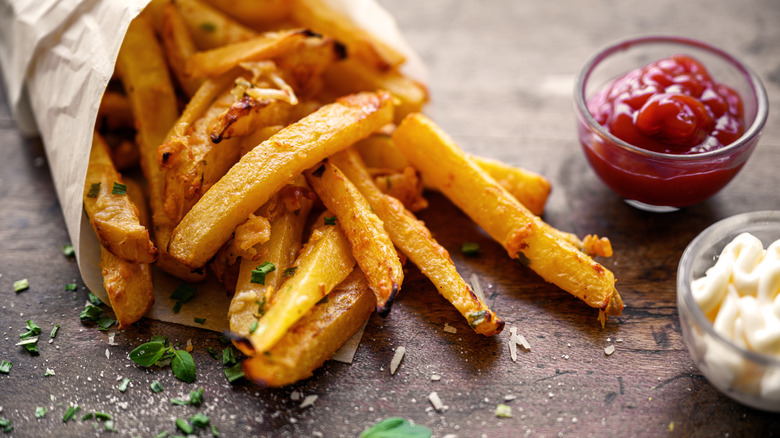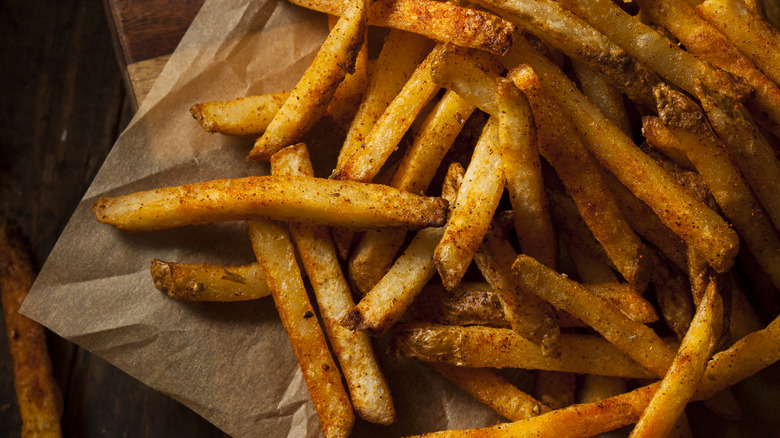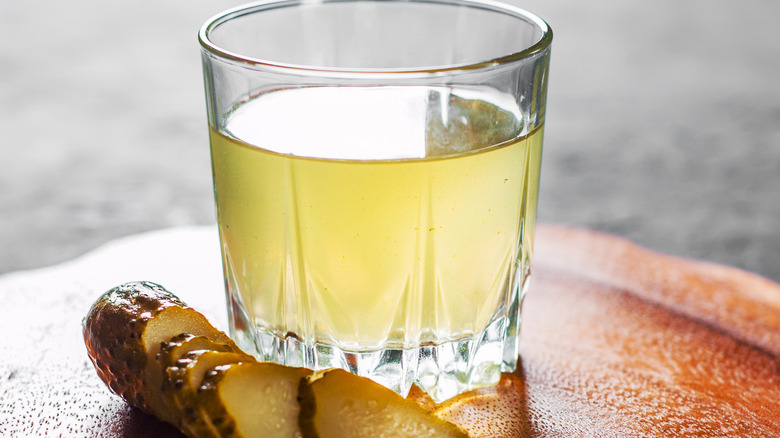It's About Time You Started Brining Your French Fries
Crispy, salty, crunchy — there's nothing quite like a good french fry. They're the perfect side dish for sandwiches of all kinds, as well as burgers, hot dogs, fried chicken, and even a refined steak. They're a delicious culinary vehicle for condiments both creative and classic. When they're done right, you'll be licking the plate; when they're done wrong, they can be soggy and bland. Especially if you're cooking up french fries at home, the texture and flavor can be hard to master. Brining your fries is a good way to take the dish to the next level.
Brining is a technique generally associated with animal proteins. By soaking the meat in a simple salt solution (that often also includes sugar or some kind of seasoning), brining turkeys for Thanksgiving or chickens for roasting is a tried-and-true way of ensuring moist and flavorful meat. A similar principle applies when it comes to potatoes — the brine will impart a delicious, salty, and seasoned flavor. It will also help the french fries crisp up and keep the right texture when they're cooking. Once you start brining your homemade french fries, you'll never look back.
Brining makes potatoes even better
When it comes to proteins, brining works through the process of osmosis. The saltwater solution is absorbed into the meat until the salt levels in the protein and the water are equal. Thanks to the now-higher liquid content, the meat will dry out less during cooking. The salt also denatures the proteins, breaking them down and helping to keep the meat tender.
For pre-fried french fries, soaking in this saltwater brine draws out extra moisture and removes excess starch from the potato. Too much starch can make the fries cook unevenly and add an unappetizing, gooey layer on the outside. The sugars in the starch can also become brown too quickly during cooking. The amount of time needed for the soak is widely debated: Some say that only around 15 minutes is necessary to achieve the brine's texture assistance, while others say that around 2–3 hours and even overnight is the better solution for realizing the fries' maximum crispiness. Regardless of the brine time, make sure to remove the excess moisture with a paper towel or cloth before you fry.
Beyond the crunch, the brine will also offer up its salty flavor. Especially if you choose to soak for a longer time, this is a key fact to remember — it's easy to over-salt. Make sure to taste the brined fries before you add any more salt or seasoning to avoid ruining your perfectly crispy french fry batch.
Turn to the pickle for a flavor-packed brine
Although a brine can be as simple as a saltwater solution, it's not hard to expand on the technique's flavor potential while still keeping its texture benefits. Enter, the pickle. Pickle-brining your fries helps with the crispy texture since the juice includes the essential salt and water brine ingredients, but it also imparts the tangy, vinegary, and zesty taste of pickles. It can also be as simple or as complicated of a process as you want it to be. For instance, you can get some pickles from the grocery store and soak frozen french fries in leftover pickle juice for as little as 15 minutes to get a hint of the taste.
For homemade french fries, you can either take pickle juice from store-bought pickles or make your own pickle juice, then soak the potatoes in the solution for around 2 hours before you fry, bake, or air fry them. If you want to go beyond the brine, though, you can also pickle the potatoes themselves — make a pickling solution like you would for normal pickles, then seal the raw, cut potatoes in a jar of the solution for about three days to let them start to ferment. Whatever lengths you go to for the french fry brine, though, you're sure to reap the texture and flavor rewards.


